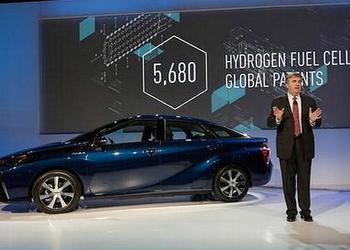
LAS VEGAS, Nevada, January 6, 2015 (ENS) – Toyota is “opening the door to the hydrogen future,” offering to share nearly 6,000 hydrogen fuel cell patents with other automakers – royalty free. Bob Carter, senior vice president of Automotive Operations at Toyota Motor Sales, USA Inc. announced the offer Monday at the 2015 Consumer Electronics Show’s Press Day in Las Vegas.
“At Toyota, we believe that when good ideas are shared, great things can happen,” said Carter.
Toyota among a record number of automakers attending CES to unveil connected car and other green technologies.

The hydrogen fuel cell patents will be made available to automakers who will produce and sell fuel cell vehicles, as well as to fuel cell parts suppliers and energy companies who establish and operate fueling stations, through the initial market introduction period, anticipated to last until 2020.
Companies working to develop and introduce fuel cell buses and industrial equipment, such as forklifts, are also covered. Requests from parts suppliers and companies looking to adapt fuel cell technology outside of the transportation sector will be evaluated on a case by case basis.
Toyota will invite royalty-free use of approximately 5,680 fuel cell related patents held globally, including critical technologies developed for the new Toyota Mirai.
The list includes approximately 1,970 patents related to fuel cell stacks, 290 associated with high-pressure hydrogen tanks, 3,350 related to fuel cell system software control and 70 patents related to hydrogen production and supply.
Carter made the patent announcement just after Toyota displayed its hydrogen-powered Mirai car at CES. The Mirai hit the market in Japan in December. It will be sold in Europe and the United States later this year.
The Toyota royalty-free patent initiative is intended to spur development and introduction of innovative hydrogen fuel cell technologies around the world, said Carter.
“The first generation hydrogen fuel cell vehicles, launched between 2015 and 2020, will be critical, requiring a concerted effort and unconventional collaboration between automakers, government regulators, academia and energy providers,” Carter told reporters at the CES.
As part of licensing agreements, Toyota will request, but will not require, that other companies share their fuel cell-related patents with Toyota for similar royalty-free use.
“By eliminating traditional corporate boundaries, we can speed the development of new technologies and move into the future of mobility more quickly, effectively and economically,” Carter said.
Carter explained that Toyota has a long history of opening its intellectual properties through collaboration, and was instrumental in facilitating the widespread adoption of hybrid vehicles by licensing related patents.
But this is the first time that Toyota has made its patents available royalty-free.
Toyota’s move follows that of Tesla Motors. Tesla chief Elon Musk opened his patents file in 2014.
This Toyota initiative builds on previous commitments, including financial support for the development of a hydrogen fueling infrastructure in California and the northeastern United States.
In May 2014, Toyota announced a $7.3 million loan to FirstElement Fuels to support the operations and maintenance of 19 hydrogen fueling stations across California.
In November 2014, Toyota announced a collaboration with Air Liquide to develop and supply a phased network of 12 state-of-the-art hydrogen stations in New York, New Jersey, Massachusetts, Connecticut and Rhode Island.
Toyota’s announcement covers only fuel cell-related patents wholly owned by the automaker. Patents related to fuel cell vehicles will be available for royalty-free licenses until the end of 2020. Patents for hydrogen production and supply will remain open for an unlimited duration.
Companies interested in Toyota’s fuel cell-related patents will negotiate individual contracts with Toyota.
Copyright Environment News Service (ENS) 2015. All rights reserved.
PHOTO: Bob Carter, senior vice president of Automotive Operations at Toyota Motor Sales, USA Inc. announces the patent offer Monday at the 2015 Consumer Electronics Show in Las Vegas. (Photo courtesy Toyota)
© 2015, Environment News Service. All rights reserved. Content may be quoted only with proper attribution and a direct link to the original article. Full reproduction is prohibited.
